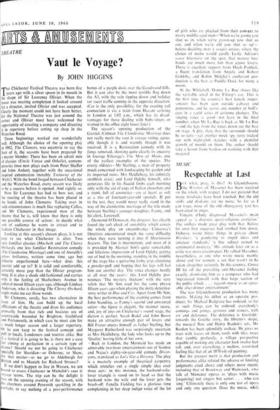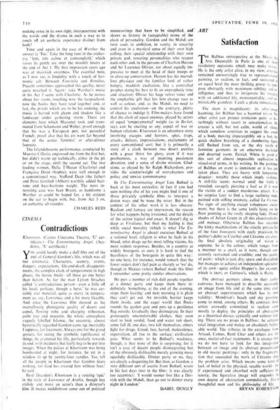Respectable at Last
no UT what, pray, is this? At Glyndebourne -Dthe Werther of Massenet has been received on the whole with respect. I do not pretend that many forelocks have been touched. But the old sniffs and disdains are no more. So far as I can trace, none of the old objurgatory text has been cited in anger.
Vincent d'Incly diagnosed Massenet's main appeal as 'a discreet, quasi-religious eroticism.' The sniffers made great play with that. Before his own first successes had soothed him down, Debussy wrote bitter things in private about Werther: 'a pandering to stupid ideas and amateur standards,' a fine subject turned to sentimental mockery.' His attitude later on as a critic was more circumspect. He rallied Massenet, nevertheless, as one who wrote music mainly about and for women, a sex that wasn't to be taken altogether seriously. In this country, Grove Ill hit off the prevailing anti-Massenet feeling exactly. dismissing him as a composer who had 'ingratiated himself with that large section of the public which . . . regards music as an agree- able after-dinner entertainment.'
The new Glyndebourne production has many merits. Making his debut as an operatic pro- ducer, Sir Michael Redgrave has ordered, so far as such things can be ordered, everybody's comings and goings. gestures and stances, with art and deference. The deference is fourfold: towards the Goethe story, the libretto's shape, the musical flow and Henry Bardon's sets. Mr Bardon has been splendidly archaic. He gives us trees with !eaves on them, roofs with tiles, roses that ramble profusely, a village perspective capable of making any character look twelve feet tall, and, over everything, a mellow, varnished feeling like that of an l870-ish oil painting.
But the greatest merit is that production and performance alike refuted the adverse or limiting judgments cited above and others more recent, including that of Brockway and Weinstock, who talk of Massenet' operas as 'plays with music [requiring] not singers but actors . . . who can sing.' Ultimately there is only one test of opera and only one question. Does the music, while
making sense in its own right, interpenetrate with the words and the drama in such a way as to touch off an aesthetic experience distinct from both?
Time and again in the case of Werther the answer is 'Yes.' Take the long tune in the orches- tra, lent, tres calme et contemplatif,' which raises its gentle arc over the moonlit lovers at the end of Act 1. My first impression years ago was of mawkish sweetness. The essential note, as I now see, is limpidity with a touch of har- monic salt. Between Fanciulla and Rondine, Puccini sometimes approached this quality, never quite matched it. Again: take Werther's music in his Act 3 scene with Charlotte. As he moves about her room, touching now the harpsichord. now the books they have read together and, at last, the pistols which are to be his undoing, the music is. barred with gleam and shadow like a landscape under gathering storm. There are elements here which Massenet took and trans- muted from Schumann and Weber; proof enough that his was a European pen, not parochial French; proof also that his art went far beyond that of the astute 'feminist' or after-dinner laureate.
The Glyndebourne performance, conducted by Maestro Cillario, engrossed me from the first bar, but didn't warm up technically, either in the pit or on the stage, until the second act. The two leading women, Helia T'Hezan (Charlotte) and Frangoise Done (Sophie), were well enough in a conventional way. Stafford Dean (the father) and Peter Gottlieb (Albert) worthily added bari- tone and bass-baritone weight. The most in- teresting case was Jean Brazzi, as handsome a Werther as could be hoped for, a bit strident on the ear to begin with, but, from Act 3 on, an authentic all-rounder.
CHARLES REID



































 Previous page
Previous page